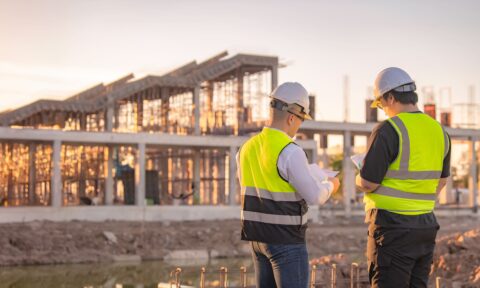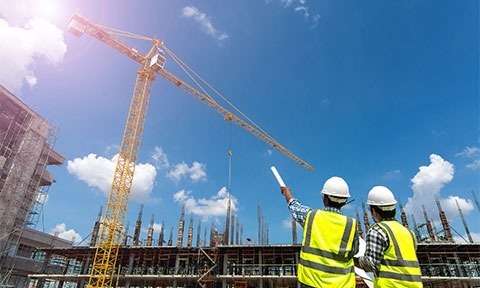Marine Renewable Energy
- Comprehensive overview of marine renewable energy sources and harvesting technologies. Insights into engineering and commercial aspects. Integration of marine energy devices into various structures. Exploration of synergies between marine renewable energy and other activities. Key topics include resource estimation, harvesting technologies, design principles, and cost-benefit analyses.
Overview
The Marine Renewable Energy Training Course offers a comprehensive overview of marine renewable energy sources and their harvesting technologies, focusing on wave, tidal, and offshore wind energy. The course covers engineering and commercial aspects, resource estimation, policy frameworks, economic analysis, and project development. Practical exercises enhance understanding, and the integration of marine energy devices into various structures is explored. Targeted at engineers, researchers, and technical leaders, the course aims to provide a deep understanding of marine renewable energy and its significance in the evolving energy landscape.
Who should attend
Engineers, Researchers, Technical Leaders
Course Content
About the event
This course provides a comprehensive overview of the most relevant marine renewable energy sources, along with their respective harvesting technologies. The lectures encompass wave and tidal energy, as well as offshore wind energy, offering insights into both engineering and commercial aspects. Practical exercises are incorporated to enhance understanding of the subject matter. The course also examines the integration of marine energy devices into various coastal, nearshore, and offshore structures, and explores the synergies between marine renewable energy technologies and other marine activities. Key topics covered include resource estimation, different types of harvesting technologies and their design and applicability, the alignment of marine renewable energy with current EU and UK policies and strategies, and cost-benefit analyses. Furthermore, the course addresses design principles, installation procedures, commissioning requirements, and decommissioning protocols for these technologies, incorporating exercises specific to each technology.
Who should attend
The target audience for this course includes engineers, researchers, and technical leaders working in companies or other entities who are interested in gaining a comprehensive understanding of Marine Renewable Energy (MRE) and its significance in the face of the emerging challenges within the energy market. The course helps them stay informed and well-prepared for the evolving energy landscape.
Programme (Lecturer: Dr Tiago Fazeres Ferradosa)
Time (GMT) Day 1:
9:00 – 10:30 Lecture 1: Introduction to Marine Renewable
Energy (MRE)
• Overview of marine renewable energy sources
(wave, tidal, offshore wind)
• Importance of marine renewable energy in the
energy market
• Environmental and sustainability aspects of
marine renewable energy
• Key variables for MRE design and resources
assessment
Break
11:00 – 12:30 Lecture 2: Wave Energy Conversion Technologies
• Principles of wave energy conversion
• Different types of wave energy devices and their
working principles
• Challenges and opportunities in wave energy
conversion
Break
13:30 – 15:00 Lecture 3: Tidal Energy Conversion Technologies
• Fundamentals of tidal energy conversion
• Types of tidal energy devices and their operation
• Site selection considerations and resource
assessment for tidal energy
Break
15:30 – 17:00 Lecture 4: Offshore Wind Energy
• Introduction to offshore wind energy and its
advantages
• Offshore wind turbine technologies and design
considerations
• Installation and maintenance of offshore wind
farms
Day 2:
9:00 – 10:30 Lecture 5: Integration of Marine Energy Devices,
Applications and Modelling
• Integration of marine energy devices into
coastal, nearshore, and offshore structures
• Physical modelling of Marine Energy Devices
• Numerical modelling of Marine Energy Devices
• Synergies and challenges associated with
integrating marine energy with other marine
activities (e.g. aquaculture, tourism)
Break
11:00 – 12:30 Lecture 6: Policy and Regulatory Frameworks for
Marine Renewable Energy
• Overview of current EU and national policies
related to marine renewable energy
• Legal and regulatory considerations for
deploying marine energy projects
• Support mechanisms and incentives for the
development of marine renewable energy
Break
13:30 – 15:00 Lecture 7: Resource Estimation and Assessment
• Techniques for estimating marine energy
resources (waves, tides, winds)
• Data collection and analysis methods for
resource assessment
• Case studies of resource assessment studies for
marine renewable energy projects
Break
15:30 – 17:00 Lecture 8: Economic Analysis and Project
Development
• Cost-benefit analysis of marine renewable
energy projects
• Life-cycle and economic evaluation of MRE
structures
• Project development stages and considerations
• Certification engagement
Lecturer
Dr Tiago Fazeres Ferradosa
Tiago Fazeres Ferradosa is an Assistant Professor at the Faculty of Engineering of the University of Porto and researcher of the Interdisciplinary Centre of Marine and Environmental Research (CIIMAR). Tiago is currently responsible for the R&D unit Offshore Structures & Foundations at the Research Group of Hydraulic Structures and Marine Energy. He was an MSc. researcher at University College London and developed his PhD in UPORTO on the topic of reliability
analysis of optimised scour protections for offshore foundations. He is also involved as responsible, co-responsible and team member, in the several R&D and private company projects related to offshore engineering and marine renewable energy research, such as MARINET proposal 61; HYDRALAB+ (Proteus proposal); ORACLE; POSEIDON and i.nano.WEC, AquaBreak EEA Grants, among many others. Some of its latest clients are: EDP Portugal, Total Enérgies, Jan de Nul, HAEDES B.V. and many more, including contracts for offshore marine energy projects, such as the Offshore Fenix Gas Project, Le Tréport Offshore Wind Farm, Saint-Nazaire Offshore Wind, just to name a few.
He performs supervision activities of doctoral and master degree students in civil engineering at the University of Porto and has been responsible for the organisation of more than 55 conferences,
courses, symposia and other scientific and professional events. He is the editor of the IAHR Newsflash Europe and co-Editor in Chief of Maritime Engineering (ICE). He acts as member of the editorial panel in 16 international peer-reviewed journals and was Guest Editor of SI in Renewable Energy (Elsevier) and Ocean Engineering (Elsevier) and reviewer in other 29 international peer-reviewed journals. Tiago is the author of more than 52 scientific journal peer-reviewed
publications (indexed in Scopus and WoS) and founder and coorganiser of the International Offshore Structures Design course series, he has an H-Index of 15 and more than 550 citations. He was
President of the IAHR Portugal Young Professionals Network, the Coordinator of the Young Professionals of the Portuguese Association of Water Resources and elected member of the
Monitoring Committee of the Civil Engineering Doctoral Program between 2016 and 2018. He was also Marine Ambassador Portugal at HAEDES B.V. and he is currently the Secretary for International
Cooperation of Hydraulics and Water Resources Institute (IHRH). He is the Portuguese appointed member of the Technical Committee 213 – Scour and Erosion of the ISSMGE. Dr Tiago is also the awarded researcher of the APRH best PhD thesis of 2018/2019 and the Best Young Researcher of 2021 by the JMSE, co-winner of the Halcrow Prize of the Institution of Civil Engineers in 2022 and the author of the Best JMSE article on marine engineering in 2023. He acts as an external evaluator at Stavanger University (Norway). Along with this track-record he has acted as consultant in several private projects, in Belgium, France, UK, Denmark and many other countries. He is also the President of the Specialized Commission Water and Energy of APRH and member at the Leadership Team of IAHR’s Europe Division. He is also member of the Executive Committee of the Civil
Engineering Department of Civil Engineering (FEUP).
Duration:2 Days
Cost;£695 + Vat
Marine Renewable Energy Online Training Course
Marine Renewable Energy Virtual Training Course
Online Marine Renewable Energy Training Course
Virtual Renewable Energy Online Training Course



